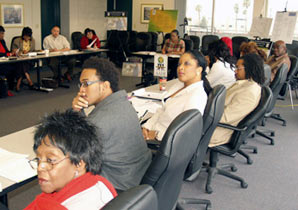"From a mental health perspective there could be triggers," Cevallos said. "Not having enough to eat, domestic violence, neighborhood violence, never learning to cope."
Cevallos said almost all of her Richmond patients have lived through traumatic experiences. Like Dorothy Perkins. Now in her 60s, Perkins said she first started suffering from depression when she was 12 years old. That's when her alcoholic father started sexually abusing her. Decades later, after her husband died of untreated diabetes, she says living with that depression became too painful. She started using crack to escape and eventually ended up living on the streets of North Richmond.
"And it was really hard out there. I mean, a black woman on the streets, elderly ... It’s very dangerous."
Perkins finally got the help she needed at Rubicon. But that's often not the case. Study author Diane Woods says that while poverty plays a significant role in blacks not having access to mental health care -- like in Dorothy Perkins' case -- there's much more to the picture. Like racism.
Of the 1,195 black study participants, most reported experiencing some level of ongoing racism regardless of their education or income. "So these constant micro-aggressions, this constant bombardment of a negative, negative, negative, negative, is something that we have to deal with continually," said Woods. "And of course, that works on your psyche, about who you are as a person and about how you fit in society and this whole idea that anything you do is never valued and it’s looked down upon."
Then there's the stigma long associated with seeking mental health services. And that, Woods says, can further alienate black people from a society that already marginalizes them.
"The respondents in our particular study indicated it had to do with symbolism," Woods said. "They do not like to be put in categories with diagnoses like bipolar, schizophrenia, that doesn’t mean anything to them. That conjures up someone who is dependent, some who is not a viable or productive individual in society. All of these mental images of someone who out of control."
The study offered a series of recommendations on addressing stigma and bridging the mental health care gap. For starters, more black providers are urgently needed. African-Americans make up 13 percent of the U.S. population but are only two percent of all psychologists, according to the 2001 Surgeon General’s Report.
The study also suggests incorporating group therapy sessions for some black patients. Woods says many of the study participants didn’t like the standard one-on-one model of mental health care. They preferred a community model, because black culture, she said, embraces a broad idea of family.
"We congregate together as groups and we like to be in groups. We like to interact with other people of like-mind and of like-thought," Woods said. "The concept that even though you are not biologically related to an individual, because of our culture, and you come from African heritage, you come from a larger family. So you hear the terms, ‘brother, sister.’"
Group therapy and supportive community housing helped Dorothy Perkins stop using drugs and work through her depression, she said.
"We talk about things we’re going through," Perkins said. "And then you get the feedback in the groups. If you’re going through something and you talk about it in the group you get the feedback. And that helps too."
Another version of this story ran on KQED Radio. Listen here:
